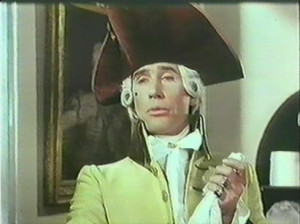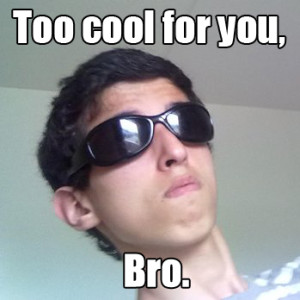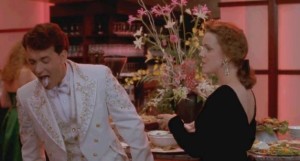I use pop culture references in my stories sometimes, I do. I try to limit them and only drop one in when it feels…well, maybe not necessary, but organic.
A ways back I turned in a story for an anthology I’d been invited into, and the editor asked me to cut the one pop culture reference I used, citing ‘Pop culture references jar the reader out of the story and should never be used.’
I disagree with this. Like many ‘rules’, I don’t think it’s an all or nothing thing. I believe, however, that it’s a careful balancing act, and there’s a definite wrong way to do it. There’s a danger of using pop culture references as a crutch or having it bleed over into author intrusion. As a writer who definitely DOES like to drop in the occasional pop, I’m going to try not to be hypocritical here. So, based on my own wince-o-meter alone, here are a few that jump out at me when I read them as the wrong way to drop the pop.
THE COP OUT
I’ve seen this mostly in contemporary, mass market novels. The author clearly wants to put a very specific character image in the reader’s head, rather than suggest physical details and allow the reader to form their own picture. So they use a pop culture reference. For example: ‘Her first thought when she saw him was that he looked like Brad Pitt.’ Then a couple chapters later, best friend chimes in: “Who’s that Brad Pitt looking guy you were with?”
Not only is this a bit lazy, it’s also strong-arming the reader. I SEE MY CHARACTER AS BRAD PITT SO I’M GONNA MAKE SURE YOU DO TO BECAUSE MAYBE SOMEDAY IT’LL GET OPTIONED FOR A MOVIE AND I WANT BRAD PITT TO PLAY THE CHARACTER BECAUSE BRAD PITT! In this case, I’d suggest giving the reader some physical details akin to your ideal image, and if you do a good job, the result will be close enough. Remember that every reader is going to experience your story differently, and that includes their mental casting of the characters, regardless of description.
THE SHOW OFF
This can be kind of a variation of info-dump, but rather than a quick shotgun blast of factoids to try advancing the plot, it’s a stiff, unnatural sounding barrage of knowledge spewed from the character’s dialog. One could say this is a form of character development, but when it goes overboard, it can be oppressive to the reader.
For example: “Mr. Bancroft, how serendipitous that you brought that up. We have much in common, it seems, as I also appreciate the works of Molière. I find it so interesting that some of his farces were only partly written, and were played in the style of Commedia dell’arte with improvisation over a canovaccio.”
Maybe if your name is something like Anne Rice and you’ve already got millions of dollars and a built-in readership, you can get a pass on this stuff. But unless you’re writing an 800 year old vampire with an aristocratic stick up his ass, find a more natural and folksy way to expose your characters’ knowledge and experience.
IT’S LIKE THIS AND LIKE THAT
I once beta read a horror novel for a friend, and have also seen this in other people’s novels–using a pop culture comparison to more or less apologize to the reader. She’d have a character creeping down into the basement after hearing a strange noise at night, and the character’s internal dialog would slot in: ‘He felt like one of those dumb characters in a horror story that went down to the basement to check out the noise rather than calling the police.’
I pointed out to this author that she might want to cut that bit, as it came off as an obvious deflection, and she responded, “But I was trying to point out that it was a cliche so the reader didn’t think I didn’t know it was a cliche.”
I said yes, I can see that, but by doing so, now it’s obvious to the reader you’re trying to point out a cliche so that they don’t think you don’t know it’s a cliche, and now they’re thinking about YOU, not the character.
So keep pop culture similes and comparisons to a minimum. If you think your plot point sounds too much like something else, maybe you ought to change it up somewhat rather than just slotting in something akin to “He felt like he was in an episode of Dexter.”
OBSCURUMUS MAXIMUS
This is about using an obscure pop culture reference supposedly to add some background development to your character, but when overdone, bleeds over into author intrusion, and on occasion, elitism.
For example: ‘When Johnny finally got Brenda back to his place, he poured them a drink, then put on his old vinyl Shriekback album from 1983. He was certain Brenda wouldn’t know the band, as most people didn’t appreciate real music anymore, or have any idea that Shriekback was probably the greatest band of all time even though most people were unfamiliar with them due to their lack of sophisticated musical tastes and the fact that Shriekback was more or less overshadowed by the more mainstream genre bands at the time, even though they weren’t nearly as good as Shriekback.”
We get it. You like Shriekback. You think they’re underrated. You’re old school and hip, and you want your readers to know this. The problem is, the readers shouldn’t be thinking about you. They should be thinking about the character, and if you’re too heavy-handed with this stuff, it comes off as author intrusion, and that DOES jar the reader out of the story. That’s the best case scenario. Worst case? You come off sounding like a douche.
IN CONCLUSION
So you get the point. Use your judgement. Read the work back to yourself, aloud, and see if it sounds too forced or hokey when you use a pop culture reference. I find a well done, clever pop-drop in a novel to be refreshing, especially if it’s done with humor, and it’s something most people will recognize easily. Be mindful of your demographic, and that they may not all be your age. Pop culture references, when used carefully and sparingly, can be a nice seasoning to a story.
But when mixed wrong or poured on too thick, they can leave a bad taste in your reader’s mouth.
Happy writing, all!



You can’t take my Buffy references from me.
No, you’re in the Goldilocks zone, JUST right!